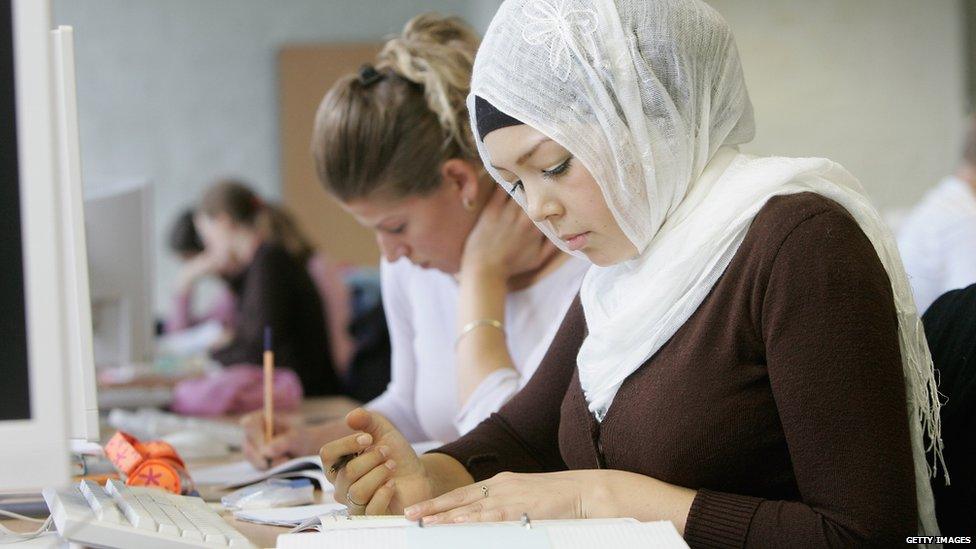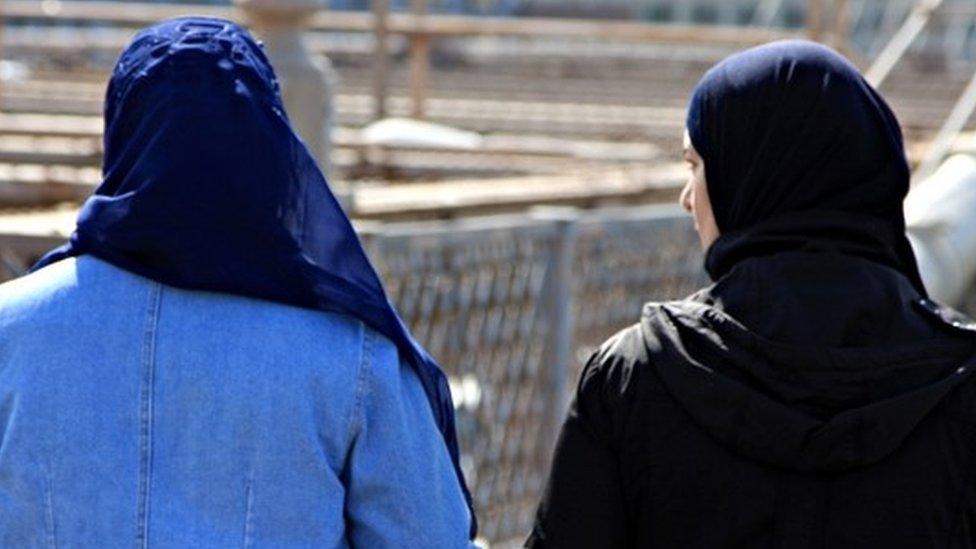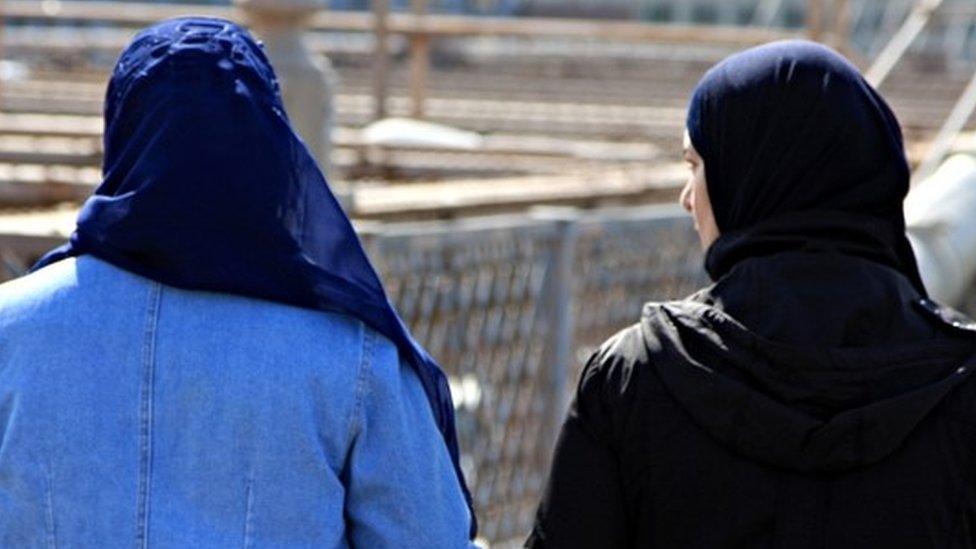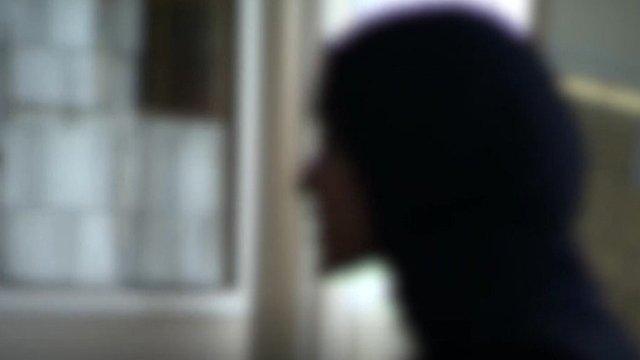Muslim women at 'disadvantage' in workplace
- Published
Two British Muslim women have been talking about their experience of the workplace
Muslim women are most likely to be at an economic disadvantage than other social groups in the UK, according to a report by MPs.
The Women and Equalities Committee, external reveals Muslim women are three times as likely to be unemployed and looking for a job than women generally.
Below are edited excerpts of the stories the BBC has received of varying experiences in the workplace.
'I wish I had the guts to start wearing the hijab again'
"I am a qualified legal professional. I have a very good academic record and experience that surpasses many of my peers who are of a similar age.
"I have had interviews with five big household name companies for the role of in-house lawyer in the last year alone and have always worn my hijab.
"After four consecutive rejections I decided to walk into my fifth job interview without my hijab. Bingo, I got the job. I now feel I have betrayed my principles for a job I could do just as well with my hijab on.
"I do not know if I would still have got this job had I worn the hijab in the interview. I wish I had the guts to start wearing it again. Hopefully, one day I will have the courage and my employers won't batter an eyelid." Ayesha
'Wearing the hijab has worked in my favour'
"I am a Muslim woman who wears the headscarf and I am a qualified secondary school teacher.
"I have never had the experience of applying for a non-teaching job before I chose to wear the hijab and was also always successful in retail jobs pre-hijab.
"I chose to wear the hijab after I completed my PGCE and I have found that it has so far worked in my favour.
"For all my five teaching jobs except one, I have been the only hijab-wearing Muslim employee. I have in fact found I have experienced positive discrimination to tick all the boxes." Aalia
'I am invisible'
"I work part-time and my colleagues treat me like an alien because I am Muslim.
"I see disinterest in their faces. I am always friendly but they never bother with me. They talk amongst themselves as though I am invisible.
"Most of the time they assume a position of superiority over me. I am not apologetic for being me and have now given up being so friendly.
"It's sad that it is not us Muslims who are failing to integrate but others and their ignorance about other cultures." Sara

'I can see the disapproval on the interviewers' faces'
"As a young female Muslim woman who wears a headscarf and also as a working mother, I do feel in the past I have faced some discrimination when job hunting.
"This usually happened once I've passed the application stage and have been offered an interview.
"As soon as I walked into some interviews I felt I already knew I was not going to be successful - I can see the disapproval on the interviewers' faces as they quickly glance up and down at what I am wearing.
"This knocked my confidence and made me feel like no matter how much experience I have and how good my education is, there are just some jobs I won't get.
"I have been completely put off from applying for any corporate jobs where I just know the culture does not support a Muslim lifestyle.
"I now work part-time for a university, which is an excellent employer, and where I feel completely welcome and I am seen as an individual, not judged on my race, colour or religion." Vasha

'Muslim culture is preventing women from working'
"I hate it when the discrimination banner is used to explain the lower statistics of Muslim women in the workforce.
"I am a Pakistani Muslim woman and have worked both in the voluntary and paid sectors since the age of 16.
"The real issue is not employers discriminating against Muslim women, but the fact that the majority of Muslim communities frown upon women working.
"I have always faced problems from within the Muslim community. Muslim men simply hate it. Responses from Muslim women are 'Your husband should provide for you!' or 'Who looks after your children?'
"In their view as a working woman, I can't be a good wife/mother/housekeeper as well.
"So I feel the real issue is actually Muslim culture preventing women from working!" Nargis
'As Muslims often live more traditionally than others, these numbers should not be a surprise'
"This is about Muslim women being economically inactive. I have been one of them for the past 15 years, because I chose to be.
"I chose to look after my children while they were young and at the same time studied for a degree in Environmental Studies with the Open University and was very happy like that.
"Society cannot dictate how people should live. As Muslims often live more traditionally than the rest of society, these numbers should not be a surprise.
"But as I start training this year for a PGCE in primary education, I do expect to have the same employment opportunities as any other woman once I qualify.
"I wear the scarf and the abaya and had an interview for a job as a French tutor. At the interview, I was told not to speak of my religion to the pupils and I obviously agreed but felt judged because of my clothes.
"Employers sometimes see us as a more complicated bet than a non-Muslim person." Catherine
'Muslims are not painted in the best light'
"I hadn't given this much thought until quite recently.
"I have never wanted to believe that my being a Muslim woman would in turn have an impact on people's perceptions of me as an individual, mainly because ignorance is bliss and also because I just thought surely I am part of a time that knows better than to discriminate.
"My parents have always pushed me to get an education and get myself a job.
"In the past though I applied for numerous jobs - very few replied and telephone interviews always went better than face-to-face interviews.
"I say this because I have been wearing a hijab for the last two years now and I've noticed the shift in attitude of some individuals.
"I don't blame them. Muslims are not painted in the best light, but it's still disappointing.
"One thing it does reinforce in me is to not judge a book by its cover." Anon
Produced by Kerry Alexandra, The BBC's UGC and Social News team
- Published11 August 2016

- Published11 August 2016
